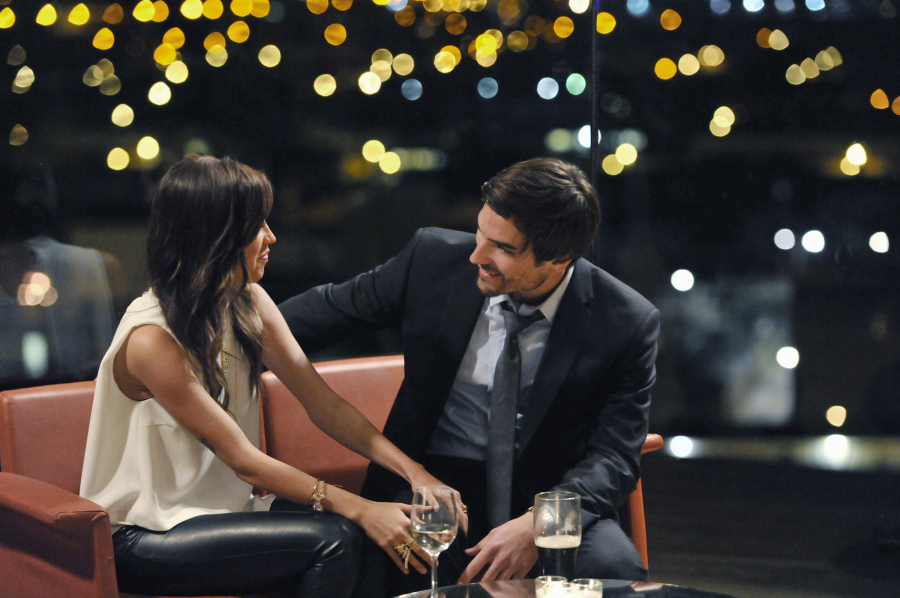
For many years, many fans of The Bachelor and Bachelorette franchises have been waiting for the shows to become more diverse. Of the 20 seasons of The Bachelor and 11 seasons of The Bachelorette, only one, Juan Pablo Galavis’s season, has starred a person of color. So it’s no wonder that hopes were high for Caila Quinn, the woman who’d previously been reported to be anchoring the next season of The Bachelorette. In addition to charming the franchise’s fans during her stint trying to win the heart of recent Bachelor Ben Higgins, she’d also have provided a new perspective, as the daughter of a white man and Filipina woman.
ABC has announced, though, that the reported Quinn season is not to be; JoJo Fletcher, a white woman, will be the one handing out the roses next time. (Both Quinn and Fletcher had appeared as potential matches for Higgins on the just-concluded Bachelor season, in keeping with the show’s recent habit of drawing its new stars from the pool of rejected suitors.) Good for Fletcher! But disappointed fans should blame their peers. The Bachelor reflects what the viewers want, and the ratings prove people are fine without a diverse cast.
As I wrote yesterday, The Bachelor has grown exhaustingly meta about fans’ criticisms of it, particularly as those fans critique the show on social media. Unlike scripted shows following a creator’s artistic vision, The Bachelor has no mission but to dole out red meat to its fans. Perhaps no show is made with a more careful eye on fan expectations, up to and including the consistent casting of “fan favorites” from the largely, though not entirely, white dating pool. ABC entertainment chief Paul Lee teasing a “diverse” bachelorette in January means next to nothing given the show’s inertia (besides, he was fired shortly after the tease.) The show’s creators have taken a calculated risk that the annoyance of fans over a consistent lack of diversity will make less of a ratings impact than any divergence from the show’s particular vision of romance would.
And they don’t seem to be wrong. The Bachelor is still a major ratings hit and, anecdotally, seems to be talked about more than ever—it’s an asset that ABC has taken assiduous care in protecting in the most risk-averse manner possible. That casting a nonwhite Bachelor or Bachelorette would seem to have huge potential upside matters little in this calculus; at this point, if the ABC reality franchise were going to cast anyone outside of their preferred mold, they’d have done so.
If no show is more aware of its faults than The Bachelor, no show, too, is more grudgingly tolerated by its notional fans, who rightly perceive a savvy wit beneath the retrograde racial and gender politics but who have to wade through a lot of stuff to get there. For all their flaws, competition reality series including Survivor, Project Runway, and Top Chef are wildly more diverse than The Bachelor. Across the dial (and particularly on The Bachelor‘s home network, ABC!), there’s never been a more exciting time for representation on television. The Bachelor and The Bachelorette depict, over and over, a vision of romance that has certain particulars (ties to an idyllic heartland America, overearnest shock at just how difficult this process is, race). At a certain point—say, a combined 31 cycles in—it stops making sense to hope for any change other than, if one actually wants the possibility of a new story, a change of the channel.
More Must-Reads from TIME
- Where Trump 2.0 Will Differ From 1.0
- How Elon Musk Became a Kingmaker
- The Power—And Limits—of Peer Support
- The 100 Must-Read Books of 2024
- Column: If Optimism Feels Ridiculous Now, Try Hope
- The Future of Climate Action Is Trade Policy
- FX’s Say Nothing Is the Must-Watch Political Thriller of 2024
- Merle Bombardieri Is Helping People Make the Baby Decision
Contact us at letters@time.com